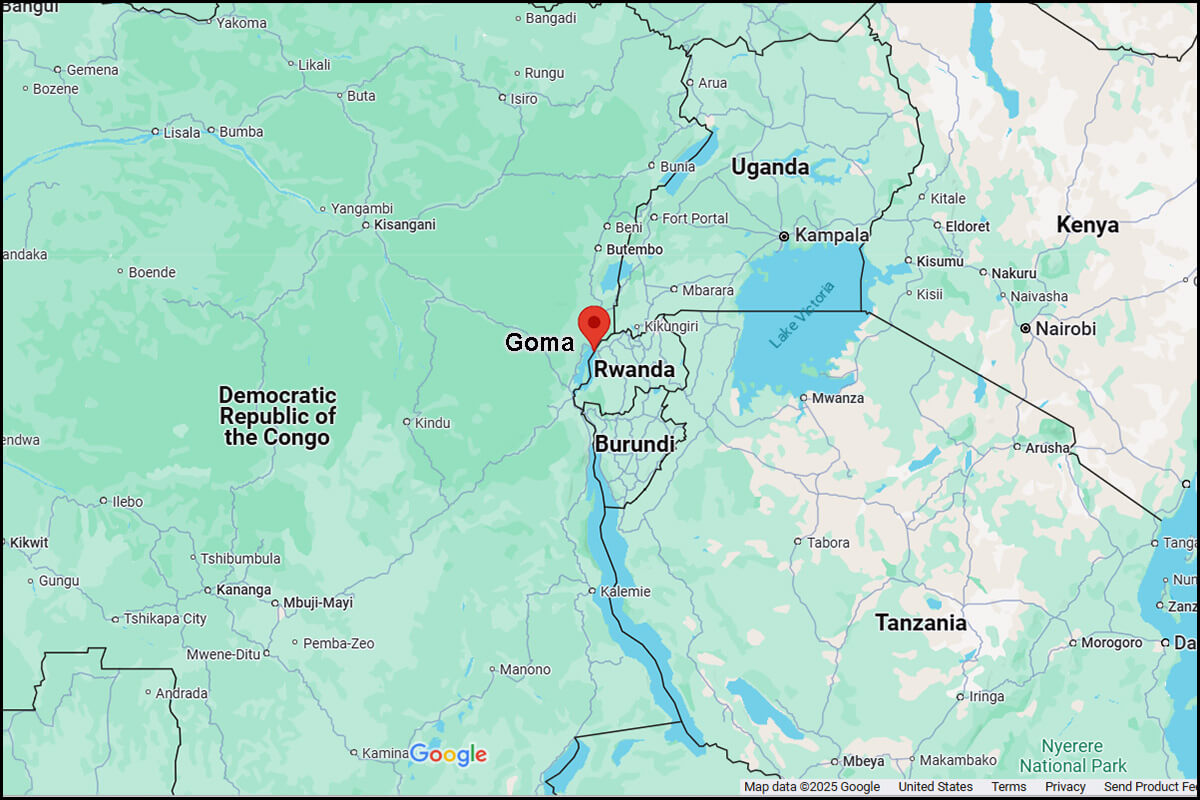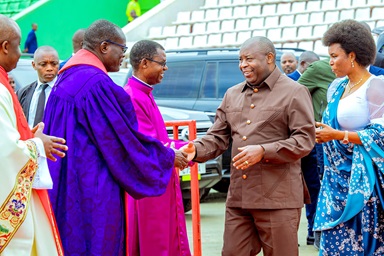Key points:
- At least 100 people, including eight United Methodists, were killed in fighting in Goma in eastern Congo.
- Since Jan. 23, the provincial capital of North Kivu has been the scene of violent clashes between the armed forces of the Democratic Republic of Congo and the Rwandan-backed M23 rebels.
- Bishop Gabriel Yemba Unda of the East Congo Episcopal Area encouraged church members not to lose hope and to stay at home during this difficult period.
Fighting in Goma in the Democratic Republic of Congo has left nearly 100 people dead, including eight United Methodists, and almost a thousand wounded, according to a count by Agence France Presse from the city’s hospitals.
Léonard Telonga, lay leader of the church’s Kivu Conference, confirmed the deaths of United Methodist church members.
“The victims include a 10-year-old child at the local Okako Olela church, three faithful United Methodists from the local CCLK church (two children and a 35-year-old mother), three faithful from the local Majengo church who were refugees from Rutshuru, and a 16-year-old child from the local Amani church,’’ Telonga said.
The city of Goma, the provincial capital of North Kivu, is currently the scene of violent clashes between the armed forces of the Democratic Republic of Congo and the M23 rebels, supported by Rwanda. Since the M23’s major offensive on Jan. 23, the security situation has continued to deteriorate.
The fighting, which is taking place in the middle of the city, has mainly affected the Biréré and Bujovu districts and the area around the airport, resulting in light and heavy weapons fire. The population, estimated at around 2 million, is suffering the consequences of the clashes. Hospitals, overwhelmed by the influx of wounded, are struggling to meet medical needs. Essential services such as water, electricity and internet have been severely disrupted.
The situation is described as “extremely worrying” by the United Nations. The humanitarian situation is exacerbated by looting, gender-based violence and attacks on humanitarian facilities. The UN also has warned that food aid distribution has been suspended.
How to help
Jean Tshomba, coordinator of the United Methodist Committee on Relief’s disaster management office in eastern Congo, said that the situation in Goma is truly worrying.
‘‘The situation is very volatile and difficult to assess precisely due to the ongoing fighting in downtown Goma,’’ Tshomba said. ‘‘The city was already filled with millions of displaced people who had fled their villages to find refuge in Goma.’’
Now that Goma is under attack, displaced people are taking refuge in churches and other makeshift shelters.
The Rev. Henry Jean Robert Kasongo Numbize, Goma District superintendent and bishop’s delegate in North Kivu, said the situation is critically affecting local churches.
“Our Christians are scattered here and there. It’s been two weeks since the church has been practiced. We don’t meet throughout the city of Goma, where we have more than four (United Methodist) churches. On top of that, we’ve taken in over 200 people from our local church in Amani, including women, men and children. So they’re amassed there without water, food or even a hygienic station capable of containing their needs,” he said.
Telonga said that more than 300 United Methodist families had managed to flee the war to Bukavu, where they have taken refuge since last week.
The United Methodist Committee on Relief is responding through its regional partners and has issued two $10,000 solidarity grants for relief.
“UMCOR is alarmed by the worsening conflict and violence in eastern Congo and prays for the safety of the thousands of displaced people in the region,’’ said Jim Cox, the relief agency’s executive director.
A recent grant from the United Methodist Committee on Relief assisted more than 12,000 people in Beni, Congo, who have been displaced by conflict.
Read story Church responds to humanitarian crisis in Congo
The Rev. Judy Chung, executive director of missionary service for the United Methodist Board of Global Ministries, said no United Methodist missionaries are located in Goma, but the mission agency is actively monitoring all regions of the Democratic Republic of Congo where mission personnel are located. She said some who live in more remote areas of the country have been evacuated to Lubumbashi.
United Methodist Bishop Gabriel Yemba Unda — speaking from the town of Kindu, the seat of the East Congo Episcopal Area — sent a message of comfort. In his address, he expressed his support for the faithful of Goma, Bukavu, Masisi, Rutshuru, Beni, Uvira and Fizi, encouraging them not to lose hope and to stay at home during this difficult period.
“My heart goes out to you in prayer, and do not lose hope, for victory is certain. The God who saved the people of Israel will not abandon you. The restoration of peace to eastern Congo is still possible. Let us all be united in prayer, and our God will work his miracle,” Unda said.
Subscribe to our
e-newsletter
Meanwhile, in the midst of the ongoing conflict, the Christian denominations of Congo launched a strategy for peace on Jan. 15 to help churches cope with the country’s prolonged violence and humanitarian crisis.
The World Council of Churches reports that the Church of Christ in Congo — the union of over 60 Protestant denominations — and the Roman Catholic Church have created a blueprint called the “Social Pact for Peace and Living Well Together in the Democratic Republic of Congo and Great Lakes Region.” Through in-depth workshops, the plan aims to create a national charter for peace.
The roadmap was launched as conflict intensified in eastern Congo following the re-emergence of the M23 rebels. According to Amnesty International, humanitarian organizations are reporting that over 400,000 people were displaced in January due to the ongoing clashes.
At the launch of the peace pact, the Rev. Eric Nsenga with the Church of Christ in Congo and Father Donatien Nshole of the National Episcopal Conference of Congo said that the people in Congo are faced with an emergency at their doorsteps.
“Our prophetic mission makes it our duty to exhort people, communities and the state of our sub-region to fulfill the duty of human beings towards themselves, that of peaceful co-existence and supportive co-existence,” the leaders said in a statement.
Londe is a UM News correspondent in Congo. Lolonga is a communicator for the Kivu Conference.
News media contact: Julie Dwyer at (615) 742-5470 or [email protected]. To read more United Methodist news, subscribe to the free UM News Digests.




